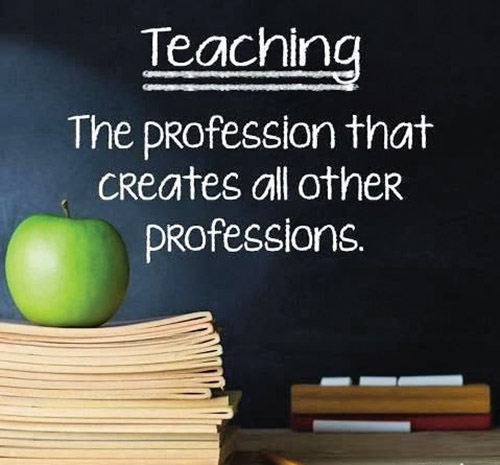


Once upon a time, teachers were revered and highly honored. The Talmud is replete with examples of how one is to honor a teacher. In the Middles Ages, Jewish communities awarded certain monopolies to teachers so that they could devote more time to teaching. Today, however, we live in a cultural milieu in which communal priorities are upside down. Athletes whose contribution to society is measured by how many people they can attract to watch them hit a ball, sink a basket or generate concussions in their opponents receive astronomical remunerations. Not so long ago, when sports were a pastime, not big business, players worked in the off season to supplement their incomes. Teachers, however, have always been part of the middle class, and often work several jobs to make ends meet. What passes for culture today bears no resemblance to the real culture of our Western and Jewish literary heritage. This is not the forum to skewer pop culture, but something is very wrong when teachers are so underappreciated and undervalued. Every great achievement can be traced back to an inspirational teacher.
Society’s attitude is mirrored by those who value financial success above all else. Some businessmen are often upset about paying teachers who “only” work 10 months a year and get off on every Jewish and secular holiday. They have no clue how hard teachers work. Most people have no idea what teachers go through each day.
Not only do they bear the awesome responsibility of educating children and instilling in them and modeling the values of derech eretz, middot kavod chachamim, but teachers introduce children to the world of ideas and the potential of their creativity. To do this they often work long hours at home preparing exciting lessons and frequently spend their own money for class projects. In addition, the two months that they are “off” often finds them working at summer camps so that they can send their kids, which they could otherwise not afford to do.
During any given day, teachers put bandages on boo-boos; structure instruction to meet the individual needs of all students; make sure they understand disease control and hygiene; teach them to resist drugs, alcohol and tobacco; give career counseling; get them on and off the bus safely; provide computer instruction; stop bullying; teach them to say I’m sorry and mean it; help develop collaborative skills; instill an understanding of civil rights and the political process; challenge racism; foster social and religious tolerance and appreciation for religious and cultural diversity; teach principles of free enterprise, how to be a wise consumer and how to manage their money; preach exercise and weight control; teach Zionism and Jewish history; preach the impact of lashon hara; teach them to read and write in Hebrew and how to read Rashi; teach how to use reason; teach them to revere and preserve the environment; teach how to access information; teach how to make wise choices; help foster loyalty to the ideals of a democracy and also foster patriotism; teach good oral hygiene; instill respect for the worth and dignity of each individual; nurture curiosity; encourage a good question; and build self-esteem, and then they also teach reading, writing and arithmetic.
Parents don’t always appreciate that their child’s teacher spends more time with their child one on one and often knows that child better than the parents. When presented with a variety of “issues” about their children, parents are often defensive. Children pick up on this and we still hear the occasional child telling a teacher: “My parents pay your salary” or “My dad is on the board.” There was a time when families dreaded a call from a teacher. Today the political reality is that the teacher may get in trouble if an influential parent gets upset by a teacher trying to help a child.
No one becomes a teacher to get rich. What does a teacher make? Teachers make kids work harder than they thought they could. They can make a C+ student feel like he just climbed Mt. Everest or hit a grand slam home run. They can make an A- feel like a slap in the face if the child gave anything less than their very best. Teachers make kids sit through study hall in absolute silence and don’t let them go to the bathroom just because they’re bored. Teachers make parents tremble in fear when they call home around dinnertime and tell them that they want to talk to them about something their child said today in class—“He explained the gemara exactly like the Rashba without ever seeing it inside. It was brilliant!” They help make parents see their children for who they are and who they can be. Teachers make kids wonder, question and criticize. They make them read, make them write and make them spell.
What do teachers make? They make a difference.
By Wallace GreeneBy Wallace Greene
Dr. Wallace Greene has been privileged to work collaboratively with many gifted teachers and pioneered audio-visual clinical evaluations.











